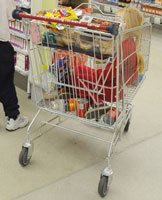






This after trade union Solidarity's food price index showed that the country's major retailers have increased their food prices by 5.5% for the first four months of this year.
Statistics South Africa reported that producer price inflation (the cost of goods at the factory gate) had slowed to 7.3% in February from 9.2% in January.
The bulk of the decline came from lower food and base metals prices.
And despite an easing in fuel prices this year, to current levels of R7.24, retailers claimed this was among the reasons for high prices.
Tony Twine, retail analyst at Econometrix, said the link between fuel and food prices "is hopelessly overplayed, even by influential people like the minister of finance".
Thami Bolani, chairman of the National Consumer Forum, said the increases were no surprise and lashed retailers' "lousy excuses" while chasing "super profits".
"The food industry is still dominated by only a few players. Consumers are not getting a fair deal. Unless there is action by the government and civil society, this will continue to happen," Bolani said.
The index tracked a basket of common food items such as bread, milk, cooking oil, margarine and sugar from major retailers Pick n Pay, Checkers and Spar.
Solidarity spokesman Jaco Kleynhans said the Woolworths chain was not part of the survey because it "is a different kind of supermarket".
"They are a luxury brand. They don't sell a lot of the brand names we were focusing on, which made it difficult to compare," he said.
The highest increase showed at Pick n Pay tills, where prices in the basket rose 8.1%, while Checkers' prices rose by 5.1%. Spar's increase was a relatively modest at 3.1%.
Kleynhans said: "Suppliers, such as milk farmers, are getting paid less than what they received at the beginning of the year. This is showing that food processors and retailers are not passing on the profit to consumers. They're just taking bigger profits."
But the retailers have hit back.
Sarita van Wyk, Shoprite Checkers' spokeswoman, said food inflation remained high due to "rising input costs", which includes any cost relating to getting goods on store shelves.
She said: "There is also the recovery of input costs over the past year, when food prices were fuelled by global shortages and the weakening of the rand."
Van Wyk said Shoprite had cut internal costs and subsidised increases where possible in order to "minimise the block of manufacturers' price increases".
Mike Prentice, Spar's merchandising executive, said there would be a slowdown in food inflation over the next six months.
"We have six centralised warehouses and when we know about an impending price increase, we buy up stock. We have limited space, but it does postpone our own increases.
"The currency is stabilising and prices from suppliers are slowing down. Staple products, such as cooking oil and maize, are actually coming down and rice has been flat," Prentice said.
Kevin Korb, food merchandising director at Pick n Pay, said the group's internal inflation was running at 13.9% over the 12 months to February, showing that the company is "absorbing a good deal of the price increases".
"However, commodities prices are stabilising and we have seen price decreases in certain items, notably maize, sunflower oil, margarine and cheese, all of which were immediately passed on to the consumer," he said.
Twine said shelf prices were not necessarily related to input costs that retailers took on.
"Last year, people saw both food and fuel prices increasing by 35% and were hypnotised into thinking they were linked. Global food prices have not retreated in line with the fall in oil prices.
"The simple fact is that the pressure on food is higher because more people want to buy food, and less are looking to buy oil," Twine said.
Khulekani Dlamini, director at Afena Capital, said all input indicators, including the rand, interest rates and fuel prices, had moved in favour of lower prices but that this would not necessarily translate to an actual decline.
Bolani said the National Consumer Forum had in February called on the government to establish an independent inquiry into food prices.
Clover 2 litre milk
Ricoffy 750 grams
Omo Auto 2kg
Source: The Times
Published courtesy of